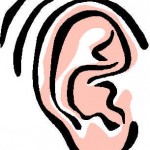 Let’s face it: when it comes to etiquette – which usually means simply exhibiting good manners in public – most of us are victims of a double standard. There is the standard to which you and I hold ourselves; and then there is the substantially lower standard which we and most of society find minimally acceptable. And we have learned over time that trying to help others move up to a higher standard is a losing proposition. The reason is a particular Catch-22 in the etiquette rulebook which dictates that calling someone out on a breach of etiquette is itself a breach of etiquette. Even if you attempt to delicately point out to your friend in private his opportunity for improvement, don’t count on any gratitude in return. Your best bet will be to make your point as best you can through the example you quietly project, recognizing that the only benefit, in all likelihood, will be the personal satisfaction you can take from at least attempting to raise the bar for civilized behavior.
Let’s face it: when it comes to etiquette – which usually means simply exhibiting good manners in public – most of us are victims of a double standard. There is the standard to which you and I hold ourselves; and then there is the substantially lower standard which we and most of society find minimally acceptable. And we have learned over time that trying to help others move up to a higher standard is a losing proposition. The reason is a particular Catch-22 in the etiquette rulebook which dictates that calling someone out on a breach of etiquette is itself a breach of etiquette. Even if you attempt to delicately point out to your friend in private his opportunity for improvement, don’t count on any gratitude in return. Your best bet will be to make your point as best you can through the example you quietly project, recognizing that the only benefit, in all likelihood, will be the personal satisfaction you can take from at least attempting to raise the bar for civilized behavior.
Posted on 15 August 2017 Comments (0)
Tags: Anna's Posts, Attitude, Behaviors, Business Etiquette, Business Social Etiquette, Career Killers, Civility, communication, Leadership, Personal Development, Speaking Skills
 Today’s political environment is so charged that family members sometimes end up not talking to each other. Recently, I was riding in a car and the conversation turned challenging. I requested we not talk about politics unless we could agree to discuss by listening to each other’s point of view. We also agreed if we could not agree to disagree we should talk about other topics instead. If an agreement cannot be made to agree to disagree, then it is better not to discuss politics or any highly charged topic.
Today’s political environment is so charged that family members sometimes end up not talking to each other. Recently, I was riding in a car and the conversation turned challenging. I requested we not talk about politics unless we could agree to discuss by listening to each other’s point of view. We also agreed if we could not agree to disagree we should talk about other topics instead. If an agreement cannot be made to agree to disagree, then it is better not to discuss politics or any highly charged topic.
 Sharing a meal with a new manager or employee is a great way to get to know each other on neutral ground. If time and geography allow, I always meet a potential new client before a proposal is written.
Sharing a meal with a new manager or employee is a great way to get to know each other on neutral ground. If time and geography allow, I always meet a potential new client before a proposal is written.
Recently, while coaching a group, it came up that they never had the opportunity to share a meal together. Food can be brought in during a lunch time. Since that time they had several opportunities to share a meal including once to celebrate and another time as they collaborated on a long project. Taking a client out for lunch or dinner as a thank you or just to get to know them can serve many purposes. I highly recommend it.
 More and more folks today wear hearing aids. They are not just for the elderly any more. Be sensitive to those who are using them. You don’t have speak loudly, just directly and succinctly. Speaking loudly makes it sometimes harder to hear. Do not act annoyed or impatient, instead, seek to understand. Wearing hearing aids can be very challenging for the new user.
More and more folks today wear hearing aids. They are not just for the elderly any more. Be sensitive to those who are using them. You don’t have speak loudly, just directly and succinctly. Speaking loudly makes it sometimes harder to hear. Do not act annoyed or impatient, instead, seek to understand. Wearing hearing aids can be very challenging for the new user.
 I often hear complaints about those who are never on time. They arrive late, run overtime in meetings causing extended sessions that nobody wants. Everyone is busy and it shows a lack of respect for those waiting. Here are some tips to stay on time:
I often hear complaints about those who are never on time. They arrive late, run overtime in meetings causing extended sessions that nobody wants. Everyone is busy and it shows a lack of respect for those waiting. Here are some tips to stay on time:
• Plan to arrive 15 minutes early
• Plan a 60-minute meeting agenda for 50 minutes
• If you need more time as a presenter, ask for it in the beginning of the talk
• Always assume everyone’s schedules are busier than yours
Posted on 04 July 2017 Comments (0)
Tags: Anna's Posts, Appearance, Attitude, Behaviors, Body Language, Business Etiquette, Business Social Etiquette, Career Builders, Civility, communication, Leadership Presence, Personal Development, Professional Development
 A handshake is a personal touch to establish a relationship. The dictionary states that a handshake is “a gripping and shaking of right hands by two individuals, as to symbolize greeting, congratulation, agreement, or farewell.”
A handshake is a personal touch to establish a relationship. The dictionary states that a handshake is “a gripping and shaking of right hands by two individuals, as to symbolize greeting, congratulation, agreement, or farewell.”
I am continually surprised at the greeting handshakes that are either only finger tips touching or the grip is so strong it hurts. If you cannot shake hands for health reasons, just say I would love to shake your hand but I have a terrible cold or ___. It is better to speak up than to ignore shaking hands.
The five-star handshake is palm to palm, nice and firm with one or two pumps made while you look each other directly in the eye. This handshake says I want to get to know you.
 Hugging in professional setting is really only acceptable when folks have a long term relationship and hugging has been established early on. If you want to hug someone, ask for permission to do so.
Hugging in professional setting is really only acceptable when folks have a long term relationship and hugging has been established early on. If you want to hug someone, ask for permission to do so.
If you are not a hugger and have been asked if you can be hugged, it is your right to say no. However, do so in a way that lets the person know you want to have a relationship with them.
Hugging can be tricky when it involves men and women so proceed with caution. I personally like hugging a long term friend and client. It says to them I enjoy working with you.
 In a recent brewing scandal involving a major sports organization, the president of the group made a statement about it. What impressed me about this is that the president refrained from the usual allegation denial. Instead, he expressed concern while stating the incident was under investigation and would be addressed after the findings were revealed.
In a recent brewing scandal involving a major sports organization, the president of the group made a statement about it. What impressed me about this is that the president refrained from the usual allegation denial. Instead, he expressed concern while stating the incident was under investigation and would be addressed after the findings were revealed.
It was genuinely felt that the organization would be honest with the findings. Delivering difficult news must be heartfelt and honest. This approach was much better than not speaking about the situation or worse, defending it before all the facts were in.
 Often, questions are asked in an intrusive manner during troublesome situations. The tone of voice is as culpable as words in creating a polarized environment as are gotcha questions. We see this in television interviews.
Often, questions are asked in an intrusive manner during troublesome situations. The tone of voice is as culpable as words in creating a polarized environment as are gotcha questions. We see this in television interviews.
Clients with impressive technical skills sometimes act like bulls wandering in a china shop when asking questions. The message to others when this occurs is: I don’t want to work with you.
Start with what they do well and then ask how we can make the situation better to secure a successful result. When they offer what does not work begin to ask the “Why” question which, when answered truthfully, usually brings out a viable solution.
 The last article of a favorite Chicago Tribune business section columnist reiterated that he has not changed his opinion. Being nice, kind and thoughtful is critical to business success.
The last article of a favorite Chicago Tribune business section columnist reiterated that he has not changed his opinion. Being nice, kind and thoughtful is critical to business success.
In my twenty plus years, I have found the executives with longevity are the ones who are good business people but also known as nice folks.
 Let’s face it: when it comes to etiquette – which usually means simply exhibiting good manners in public – most of us are victims of a double standard. There is the standard to which you and I hold ourselves; and then there is the substantially lower standard which we and most of society find minimally acceptable. And we have learned over time that trying to help others move up to a higher standard is a losing proposition. The reason is a particular Catch-22 in the etiquette rulebook which dictates that calling someone out on a breach of etiquette is itself a breach of etiquette. Even if you attempt to delicately point out to your friend in private his opportunity for improvement, don’t count on any gratitude in return. Your best bet will be to make your point as best you can through the example you quietly project, recognizing that the only benefit, in all likelihood, will be the personal satisfaction you can take from at least attempting to raise the bar for civilized behavior.
Let’s face it: when it comes to etiquette – which usually means simply exhibiting good manners in public – most of us are victims of a double standard. There is the standard to which you and I hold ourselves; and then there is the substantially lower standard which we and most of society find minimally acceptable. And we have learned over time that trying to help others move up to a higher standard is a losing proposition. The reason is a particular Catch-22 in the etiquette rulebook which dictates that calling someone out on a breach of etiquette is itself a breach of etiquette. Even if you attempt to delicately point out to your friend in private his opportunity for improvement, don’t count on any gratitude in return. Your best bet will be to make your point as best you can through the example you quietly project, recognizing that the only benefit, in all likelihood, will be the personal satisfaction you can take from at least attempting to raise the bar for civilized behavior.

 Today’s political environment is so charged that family members sometimes end up not talking to each other. Recently, I was riding in a car and the conversation turned challenging. I requested we not talk about politics unless we could agree to discuss by listening to each other’s point of view. We also agreed if we could not agree to disagree we should talk about other topics instead. If an agreement cannot be made to agree to disagree, then it is better not to discuss politics or any highly charged topic.
Today’s political environment is so charged that family members sometimes end up not talking to each other. Recently, I was riding in a car and the conversation turned challenging. I requested we not talk about politics unless we could agree to discuss by listening to each other’s point of view. We also agreed if we could not agree to disagree we should talk about other topics instead. If an agreement cannot be made to agree to disagree, then it is better not to discuss politics or any highly charged topic. Sharing a meal with a new manager or employee is a great way to get to know each other on neutral ground. If time and geography allow, I always meet a potential new client before a proposal is written.
Sharing a meal with a new manager or employee is a great way to get to know each other on neutral ground. If time and geography allow, I always meet a potential new client before a proposal is written. More and more folks today wear hearing aids. They are not just for the elderly any more. Be sensitive to those who are using them. You don’t have speak loudly, just directly and succinctly. Speaking loudly makes it sometimes harder to hear. Do not act annoyed or impatient, instead, seek to understand. Wearing hearing aids can be very challenging for the new user.
More and more folks today wear hearing aids. They are not just for the elderly any more. Be sensitive to those who are using them. You don’t have speak loudly, just directly and succinctly. Speaking loudly makes it sometimes harder to hear. Do not act annoyed or impatient, instead, seek to understand. Wearing hearing aids can be very challenging for the new user. I often hear complaints about those who are never on time. They arrive late, run overtime in meetings causing extended sessions that nobody wants. Everyone is busy and it shows a lack of respect for those waiting. Here are some tips to stay on time:
I often hear complaints about those who are never on time. They arrive late, run overtime in meetings causing extended sessions that nobody wants. Everyone is busy and it shows a lack of respect for those waiting. Here are some tips to stay on time: A handshake is a personal touch to establish a relationship. The dictionary states that a handshake is “a gripping and shaking of right hands by two individuals, as to symbolize greeting, congratulation, agreement, or farewell.”
A handshake is a personal touch to establish a relationship. The dictionary states that a handshake is “a gripping and shaking of right hands by two individuals, as to symbolize greeting, congratulation, agreement, or farewell.” In a recent brewing scandal involving a major sports organization, the president of the group made a statement about it. What impressed me about this is that the president refrained from the usual allegation denial. Instead, he expressed concern while stating the incident was under investigation and would be addressed after the findings were revealed.
In a recent brewing scandal involving a major sports organization, the president of the group made a statement about it. What impressed me about this is that the president refrained from the usual allegation denial. Instead, he expressed concern while stating the incident was under investigation and would be addressed after the findings were revealed. Often, questions are asked in an intrusive manner during troublesome situations. The tone of voice is as culpable as words in creating a polarized environment as are gotcha questions. We see this in television interviews.
Often, questions are asked in an intrusive manner during troublesome situations. The tone of voice is as culpable as words in creating a polarized environment as are gotcha questions. We see this in television interviews. The last article of a favorite Chicago Tribune business section columnist reiterated that he has not changed his opinion. Being nice, kind and thoughtful is critical to business success.
The last article of a favorite Chicago Tribune business section columnist reiterated that he has not changed his opinion. Being nice, kind and thoughtful is critical to business success.

